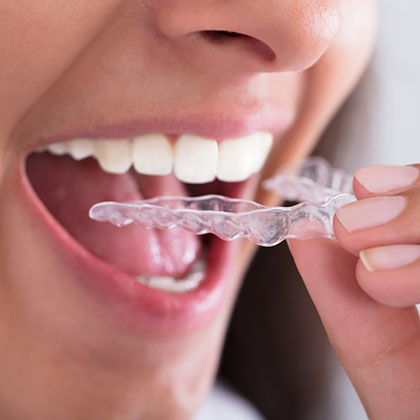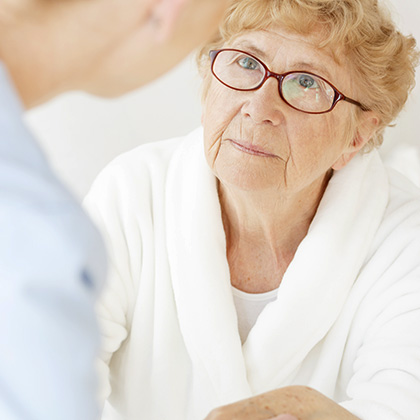
The Royal Osteoporosis Society’s bone health checklist includes all the items you’d expect to see – examples include leading an active lifestyle, eating well, getting enough vitamin D, avoiding smoking and drinking alcohol in moderation (i). But right at the top of the list is something many of us often overlook when it comes to looking after our skeletal health – that is, maintaining a healthy body weight.
A healthy body weight is an ideal goal if you want to improve your health and wellbeing in general, since carrying excess weight is linked with many long-term health problems. When it comes to your bones, it’s well established that being underweight can increase your risk of developing osteoporosis – the condition that reduces your bone density, making them more fragile and more likely to break easily. But that’s just half the story. In fact, more recently experts have discovered being overweight may be bad for your bones too. This means the optimum weight for bone health is one that’s within the normal range.
What’s a ‘normal’ weight?
For many years doctors and medical experts have used body mass index (BMI) as a measurement to define your weight status. By working out your BMI you can find out if you’re underweight, normal weight or overweight for your height.
The easiest way to find out your BMI is to use an online calculator such as the NHS BMI healthy weight calculator. All you have to do is input your height (either in feet and inches or centimetres) and your weight (in stones and pounds or kilograms) and your age, and the calculator does the rest. Your result will be a number – here’s what that number means:
-
18.5 or lower: underweight
-
18.5 - 24.9: healthy weight
-
25 - 29.9: overweight
-
30 or higher: obese
Black, Asian and some other minority ethnic groups have some slightly different BMI ranges because they have a higher risk of developing certain health problems at a lower BMI than people of white heritage. For instance, overweight for someone of one of these ethnicities is a BMI of 23 or higher, while the obese range is 27.5 or higher (ii).
If you need more details about the various health risks of being overweight or underweight there’s plenty more information on What does it mean to be underweight? and Weight loss: the facts.
How weight affects your bones
Researchers have carried out many studies to find out how losing weight or having a low BMI may affect bone health. Here are just a few of the findings some of these studies have uncovered:
-
Losing around 10 per cent of your body weight can lead to a 1 - 2 per cent bone loss in the hip and total body, and a 3 - 4 per cent loss in other bones including the trochanter (top of the thigh bone) and radius (one of the two bones in the forearm) (iii).
-
Weight-loss-induced bone density reduction in perimenopausal and postmenopausal women and older men is more than double the rate of that found in those whose weight is stable (iii).
-
Middle-aged men who have a low BMI may have a greater risk of developing osteoporosis when they’re older: those who lose five to 10 per cent of their body weight are 30 per cent more likely to develop osteoporosis, but those who gain weight have just a slightly increased risk of four per cent (iv).
-
Any bone density lost as a consequence of weight loss may not return fully when you gain the weight back, says a study of postmenopausal women (v).
-
Losing just five per cent of body weight may result in increased fracture risk as well as bone loss in both men and women (iii).
-
Bone loss is also a common negative side effect of bariatric – or weight-loss – surgery (vi).
-
Reduced bone density is one of the major complications of the eating disorder anorexia nervosa, particularly in female teenagers with anorexia (vii).
-
Having a low BMI is a major risk factor for low bone mass and increased bone loss, with one study finding it’s linked with an increased risk of osteoporosis in postmenopausal women (viii).
What happens to your bones when you lose weight?
When you do any kind of weight-bearing activity – that is, any kind of movement where your feet and legs support your whole body weight – your bones are stimulated. According to the organisation American Bone Health, weight slightly compresses the bone matrix and triggers the cells to take in more calcium and other minerals, which ultimately increases bone density (ix). So one way having a low body weight or BMI may affect your bones is that you’re not stimulating them sufficiently to keep them strong.
Indeed scientists have seen the effects of this in studies that involve weightlessness, finding that astronauts typically lose bone when they’re in space. This, they say, is because there is no weight loading of the skeleton, caused by a lack of gravity (x).
In addition to this, people following a restricted weight-loss diet may not be getting the essential nutrients they need to keep their bones strong, including calcium and vitamin D. However, there may be several other factors at play here too – here are a few examples:
-
Decreased muscle mass – which often happens with weight loss – may also negatively affect bone density (xi).
-
The production of bone-regulating hormones may be affected by weight loss – for instance, losing body fat reduces the level of oestrogen and other sex hormones in women. These are vital for bone health because they affect the activity of substances involved in bone development and remodelling (iii).
-
Substances called gut peptides that regulate satiety (the feeling of fullness after you eat) also regulate bone. However the production of these peptides – including an appetite-regulating hormone called ghrelin – may be altered in people following restricted-calorie diets (iii).
The good news is that some experts suggest losing a moderate amount of weight slowly is less likely to have a negative impact on bone density compared with losing a lot of weight quickly, especially when you combine a weight-loss diet with exercise that involves muscle strengthening exercise (resistance/weight training) and high-impact loading. (xii). Also called weight-bearing exercise with impact, high-impact loading involves being on your feet and adding an additional force or jolt through your skeleton (through jumping or skipping, for instance).
Obesity’s effect on bones
Meanwhile, being overweight or obese has traditionally been linked with improved bone health, largely because of the extra load the excess weight puts on the skeleton. But many experts now believe obesity may actually have a detrimental effect on bone health too.
It’s now thought that the advantage of having increased bone density that comes with excess weight is outweighed by the idea that a higher BMI increases the risk of fracture. Indeed, people who are obese may be more likely to suffer a fall – and risk breaking a bone – than normal-weight individuals. So having a higher bone density, in this case, may not protect obese people against the risk of fractures, with one review concluding that abdominal obesity is associated with a higher risk of hip fracture (xiii).
Other studies, meanwhile, have discovered not all obese people have high bone densities – in fact, some have significantly low bone densities for their age (xiv). Indeed, some researchers suggest that men who have high levels of body fat may also have lower bone densities and may be more likely to break a bone than other men with normal body fat levels (xiv).
Ways to keep your bones healthy
Besides being overweight or underweight there are several other factors that could increase your risk of losing bone density. These include:
-
Age (older people have a higher risk of fractures caused by reduced bone density)
-
Diets lacking in nutrients needed for bone health
-
Certain medical conditions
-
Certain prescription medicines and medical treatments
-
Overactive thyroid or parathyroid gland
-
Family history of osteoporosis
Whether you’re in a higher-risk group or not, there are steps you can take to keep your bones healthy – one of which is to try to maintain a healthy BMI. Here are some of the other things that are good for your bones:
Exercise
Staying active can help to prevent or reduce bone density decline. According to the Royal Osteoporosis Society, the most effective way to keep your bones strong through exercise is to combine weight-bearing exercise with impact and muscle- strengthening exercise (xv):
-
Low-impact activities include walking, marching and stair climbing.
-
Moderate-impact activities include skipping, hopping, jogging, running, team and racket sports and Highland dancing.
-
High-impact activities – the most effective for improving bone density – include star jumps, tuck jumps, track events, volleyball and basketball.
Meanwhile muscle strengthening exercise includes moves such as squats, lunges, leg presses, chest presses, dead lifts and bicep curls.
Whatever exercise you do, start slowly, and build up your fitness levels gradually especially if you haven’t been very active lately. Always speak to your GP before starting any new exercise regime if you have a medical condition.
Bone-supporting nutrients
Having a diet rich in foods that contain nutrients needed for healthy bones is important for us all, whatever our stage of life. This becomes even more important as you get older, and also if your BMI is anything other than normal. Research demonstrates that calcium, vitamin D and vitamin K work together to maintain bone health and reduce your risk of having a painful fracture. Other vitamins and minerals are important to your overall bone health such as magnesium, zinc and vitamin C. Protein plays an important role too. Read more about what you can eat or take in supplement form to keep your bones strong here.
For more information on bone health
The bone health section of our pharmacy health library provides lots more information and advice on keeping your bones healthy, including how diet, exercise and lifestyle can affect your skeletal health.
References:
-
Available online: https://theros.org.uk/information-and-support/bone-health/bone-health-checklist/
-
Available online: https://www.nhs.uk/live-well/healthy-weight/bmi-calculator/
-
Shapses SA, Sukumar D, Bone Metabolism in Obesity and Weight Loss. Annu Rev Nutr 2012 Aug 21;32:287-309. Available online: https://www.ncbi.nlm.nih.gov/pmc/articles/PMC4016236/
-
Meyer HE, et al., Weight change over three decades and the risk of osteoporosis in men: the Norwegian Epidemiological Osteoporosis Studies (NOREPOS). Am J Epidemiol. 2008;168:454–60. Available online: https://academic.oup.com/aje/article/168/4/454/106362?login=false
-
Villalon KL, et al., A Losing Battle: Weight Regain Does Not Restore Weight Loss-Induced Bone Loss in Postmenopausal Women. Obesity. 2011 Dec;19(12):2345-2350. Available online: https://www.ncbi.nlm.nih.gov/pmc/articles/PMC3760414/
-
Scibora LM. Skeletal effects of bariatric surgery: examining bone loss, potential mechanisms and clinical relevance. Diabetes Obes Metab. 2014 Dec;16(12):1203-13. Available online: https://dom-pubs.onlinelibrary.wiley.com/doi/10.1111/dom.12363
-
Legroux I, Cortet B. Factors influencing bone loss in anorexia nervosa: assessment and therapeutic options. RMD Open. 2019 Nov 13;5(2):e001009. Available online: https://www.ncbi.nlm.nih.gov/pmc/articles/PMC6861073/
-
Ravn P, et al. Low body mass index is an important risk factor for low bone mass and increased bone loss in early postmenopausal women. Early Postmenopausal Intervention Cohort (EPIC) study group. J Bone Miner Res. 1999 Sep;14(9):1622-7. Available online: https://asbmr.onlinelibrary.wiley.com/doi/full/10.1359/jbmr.1999.14.9.1622
-
Available online: https://americanbonehealth.org/exercise/bonesense-on-osteogenic-loading
-
Iwaniec UT, Turner RT. Influence of Body Weight on Bone Mass, Architecture, and Turnover. J Endocrinol. 2016 Sep;230(3):R115-R130. Available online: https://www.ncbi.nlm.nih.gov/pmc/articles/PMC4980254/
-
Schafer AL. Decline in Bone Mass During Weight Loss: A Cause for Concern? J Bone Miner Res. 2016 Jan;31(1):36-9. Available online: https://asbmr.onlinelibrary.wiley.com/doi/full/10.1002/jbmr.2754
-
Hunter GR, Plaisance EP, Fisher G. Weight Loss and Bone Mineral Density. Curr Oppin Endocrinol Diabetes Obes. 2014 Oct;21(5):358-363. Available online: https://www.ncbi.nlm.nih.gov/pmc/articles/PMC4217506/
-
Sadeghi O, et al.. Abdominal Obesity and Risk of Hip Fracture: A Systematic Review and Meta-Analysis of Prospective Studies. Adv Nutr. 2017 Sep 15;8(5):728-738. Available online: https://www.ncbi.nlm.nih.gov/pmc/articles/PMC5593104/
-
Greco EA, et al.. Is obesity protective for osteoporosis? Evaluation of bone mineral density in individuals with high body mass index. Int J Clin Pract. 2010 May;64(6):817-20. Available online: https://onlinelibrary.wiley.com/doi/10.1111/j.1742-1241.2009.02301.x
-
Available online: https://theros.org.uk/information-and-support/living-with-osteoporosis/exercise-and-physical-activity-with-osteoporosis/
-
Jain RK, Vokes T. Fat Mass Has Negative Effects on Bone, Especially in Men: A Cross-sectional Analysis of NHANES 2011-2018. J Clin Endocrinol Metab. 2022 May 17;107(6):e2545-e2552. Available online: https://academic.oup.com/jcem/article-abstract/107/6/e2545/6522221?redirectedFrom=fulltext&login=false
-
Weaver CM, et al.. Calcium plus vitamin D supplementation and risk of fractures: an updated meta-analysis from the National Osteoporosis Foundation. Osteoporosis Int. 2016 Jan;27(1):367-76. Available online: https://www.ncbi.nlm.nih.gov/pubmed/26510847
Related Posts
Disclaimer: The information presented by Nature's Best is for informational purposes only. It is based on scientific studies (human, animal, or in vitro), clinical experience, or traditional usage as cited in each article. The results reported may not necessarily occur in all individuals. Self-treatment is not recommended for life-threatening conditions that require medical treatment under a doctor's care. For many of the conditions discussed, treatment with prescription or over the counter medication is also available. Consult your doctor, practitioner, and/or pharmacist for any health problem and before using any supplements or before making any changes in prescribed medications.

Christine
Christine Morgan has been a freelance health and wellbeing journalist for almost 20 years, having written for numerous publications including the Daily Mirror, S Magazine, Top Sante, Healthy, Woman & Home, Zest, Allergy, Healthy Times and Pregnancy & Birth; she has also edited several titles such as Women’ Health, Shine’s Real Health & Beauty and All About Health.
View More



